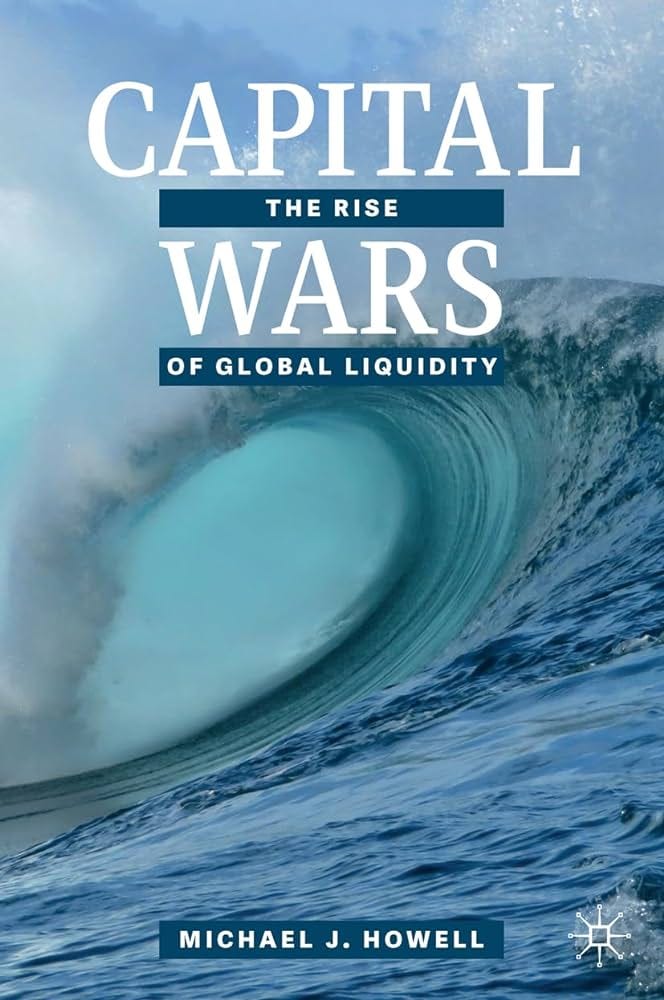A Thanksgiving Book Report... And The Week Ahead
I want to take a week to explain how the financial system works...
Dear Fellow Expat:
I’ll be heading to Florida tomorrow.
For the most part - I’m out for the week.
I’ll be providing lots of insight for Republic Risk and Insider Readers.
I never take vacations… I once wrote a 3,000 cover story during my Honeymoon.
My wife has never forgiven that publisher.
But ahead of this travel, I want to do something special.
This will be very different from traditional postcards.
We’re going back to our roots of academia. Not to graduate school…
Not to college.
We are back to middle school-level book reports.
This week, we will dissect Michael Howell's book Capital Wars.
I’ve wanted to do this for a while…
His work has been very critical to my studies in recent years. But here’s the thing.
It’s incredibly complex as a topic. Please read his book and his blog.
But I also want you to be able to understand it. So…
Let’s dive into the book chapter by chapter… and break it down at a ninth-grade level, hopefully.
This might only be for some, but… it explains how the financial system works.
You can handle it. Let’s get started.
Introduction and Chapter One
Remember when investing seemed more straightforward?
When you could look at a company's earnings, study some charts, read The Wall Street Journal, and feel pretty good about your investment decisions?
The world has changed dramatically, and the book "Capital Wars" explains why.
It turns out that about $170 trillion is sloshing around in the world economy today.
That's not a typo - and it's way bigger than the $100 trillion worth of all goods and services produced worldwide yearly (also known as GDP).
This massive pool of money.
And experts call this massive pool of capital "global liquidity."
All this money is moving worldwide at lightning speed, hunting for returns and “safe havens.” We want to understand how this enormous amount of money moves around and why it matters to your financial future.
The author, Michael Howell, developed these ideas while working at Salomon Brothers (a major Wall Street firm) in the 1980s.
His insights help explain why markets often behave in ways that defy traditional logic.
Here's the point I want to stress out of this research.
It's not inflation or interest rates that drive economic cycles anymore.
So all that chatter we hear about interest rates six times a year isn’t as crucial as people believe. What matters is these massive flows of money.
Two leading players control these flows:
The Federal Reserve (America's central bank, which manages the U.S. dollar and our banking system)
The People's Bank of China (China's central bank, which manages their currency, the Yuan, and their banking system)
What’s Driving This Flow of Money?
The world changed a lot in the last 25 years.
In 2000, China controlled only about 6% of global money flows while America controlled 32%.
According to Howell's data, China controls almost 28% of the total, while America’s share has dropped to 23%.
So, for all the chatter about U.S.-China relationships, it’s not Taiwan, democracy, or tariffs that matter.
It’s the movement of money.
So, what drove this change?
First, as Howell explains, when the Berlin Wall fell in 1989, it wasn't just about Germany reuniting.
This moment unleashed a massive economic transformation.
Suddenly, 2 billion to 3 billion people locked out of the global economy could participate.
Billions of new workers, consumers, and savers entered the world economy almost overnight.
Then, shift two?
That’s when China joined the World Trade Organization in 2001.
Overnight, China became the world's factory floor.
Money started flowing in unprecedented ways.
In just one example, within a decade of joining the WTO, more than 200 million Chinese workers—about as many people as the entire workforce of the European Union—moved from rural areas to China's export-focused coastal cities.
China has become incredibly powerful in manufacturing and trade, but it's still playing catch-up in finance. It's like they've built a massive economic engine but are still relying on someone else's fuel - in this case, U.S. dollars.
China desperately wants to challenge the dollar's dominance, especially in Asia, but it's caught in a tricky position.
It needs the U.S. financial system even as it tries to create an alternative to it.
This shift in power has created a whole new kind of competition—not just over who makes what but also over who controls the money that makes global trade possible.
It's like a financial chess game between American finance and Chinese industry.
However, the moves in this game affect everyone's economic future.
This massive power shift created what Howell calls "Capital Wars" - a financial battle between American economic power and Chinese industrial might.
Why should you care?
Howell will argue that Global Liquidity explains why:
Why stock markets go up or down
What happens to your retirement savings
Whether businesses can get loans
How stable our financial system is
The 2008 Crisis Changed the World
The 2008 financial crisis nearly collapsed the economic system - but not for the reasons you believe.
It wasn’t because companies suddenly performed poorly.
It was because these massive flows of money suddenly froze up.
Europe alone needed $8 trillion in emergency funding, Howell notes.
There was a severe problem while Europe cratered.
There wasn't any global "emergency lender" big enough to help.
Only the Federal Reserve (America's central bank) could provide that much money through memorable currency swap lines (think of these as emergency money pipelines to other countries).
But there’s been a massive change in how these emergency swaps are executed.
The Fed (which is supposed to be independent of the U.S. government) will only provide emergency financing to "favored nations."
Who isn’t a favored nation?
China… which is wild considering that China is the biggest user of dollars outside the U.S.
So, imagine being the biggest customer at a store but needing access to their emergency exits. That's China's situation.
The author argues we live in a world more like the volatile 1800s than the stable period many remember after World War II.
This isn't just academic theory.
When these money flows freeze up, as they did in 2008, the entire global economy can grind to a halt.
That's why understanding how this new system works is crucial for protecting your financial future.
The rest of the book will show exactly how these money flows work and why China and America's battle for financial control affects everyone's wealth.
Traditional investment rules no longer apply - we need to understand this new reality to make better financial decisions.
When The World Changes, the Rules Do, Too
Are you still wondering how the Fed can raise interest rates and cut its balance sheet while the S&P 500 runs to record highs? Why is Bitcoin at nearly $100,000?
Why is gold at record highs, even though it doesn’t pay dividends?
Oh… that’s because the old rules of investing - focusing only on company performance, P/E ratios, and traditional indicators - are dead.
Howell argues - and I agree - that you might need to include the bigger picture.
It's like bringing a flip phone to a smartphone world.
The game has changed.
When investors prefer holding onto "safe" assets like cash and government bonds (especially U.S. dollars) instead of investing in productive things like new businesses, it creates problems.
If governments don't make enough of these safe assets through normal borrowing, the private sector tries to create substitutes.
Of course, these alternatives tend to become less valuable during economic downturns, making the whole system shakier.
Think of global money flows like a giant wave pool at a water park.
When the waves are calm and regular, everyone can swim safely.
But when they get too big or chaotic, even good swimmers can get in trouble.
Understanding how these waves form, move, and crash is crucial for navigating today's financial markets.
This week, I’ll explain this book as best as I can.
Whether you're a seasoned investor or just starting, understanding these new rules could help you make better financial decisions and protect your wealth in ways the old playbook never could.
Now, let’s get to the week ahead.
Monday, November 25
Event: Pony AI IPO
Why it matters: Another autonomous vehicle company will test public markets with a $4.6 billion valuation. This is literally the last thing that the markets need.
Republic Speak: How does an investment in a Chinese robotaxi company sound? How many shares would you like:
How many…
How many?
Pony AI wants $4.6 billion to promise that cars will drive themselves someday.
Are we supposed to trust another Chinese mobility player in the middle of rising U.S.-China tensions? While a capital war is escalating?
Tuesday, November 26
Event: Retail Earnings Palooza (Best Buy, Macy's, Nordstrom)
Why it matters: Major retailers report earnings just before Black Friday. We’ll get some insights into consumer spending and holiday season expectations.
Republic Speak: Best Buy will tell us nobody's buying $3,000 TVs anymore.
Macy's will blame the weather for empty stores and why they haven’t sold all their real estate yet.
Nordstrom is still around?
Options traders are betting on double-digit moves because department stores can still surprise us. The earnings calls will give us a dive into terms like "inventory optimization" (we ordered too much) and "strategic pricing" (everything's on sale).
Wednesday, November 27
Event: Core PCE Price Index Report
Why it matters: The Fed's preferred inflation gauge hits right before Thanksgiving. How much is your turkey? And how much market indigestion would you like?
Republic Speak: The September PCE was at 2.7%, and we're all pretending that's close enough to the Fed's 2% target.
It's like horseshoes – close counts, right? Nah. I still think they’ve given up on services inflation. In addition, I’m still concerned that if China pumps QE into its system in the next year, we’ll see inflation return… quickly.
Remember when the Fed said inflation was transitory? That was a great laugh.
Thursday, November 28
Event: Market Closed - Thanksgiving
Why it matters: Traders get a day off to contemplate their portfolios and pie choices. Just remember that cake is superior to pie. It always will be.
Republic Speak: Tim Melvin and I will discuss a few things during Thanksgiving dinner. Don’t be surprised if banking M&A and Fed policy dominate the conversation.
Friday, November 29
Event: Black Friday Trading (Half Day) and OPEC+ Chatter
Why it matters: Holiday shopping starts while oil traders are in position for next week's OPEC+ meeting.
Republic Speak: The true Black Friday blood sport? Watching retail stocks bounce around while everyone pretends to care about 4 am sales.
Keep your stops tight and the lids to your turkey leftovers tighter.
I’ll be back to discuss Capital Wars Chapter Two tomorrow.
Stay positive,
Garrett Baldwin








Thank you very much for doing this and the work you've been doing for us. Because of you I did purchase his book. Because of your insights I do see the markets differently. But by no means do I truly understand it. That's where you've been a saving grace so to speak. I learn more every day/week through your writings. Please continue to do the amazing writings you do.
Happy Thanksgiving to you and your family.
Thanks for talking about this book because I'd never get through it... It all kind of falls in line with your father in laws viewpoint that you'll make more money reacting to the market than trying to predict it, so it's good to be educated.